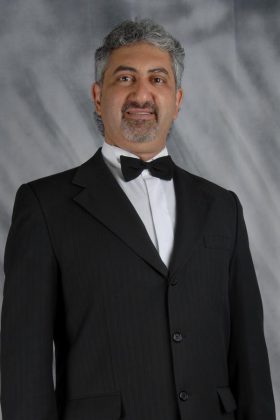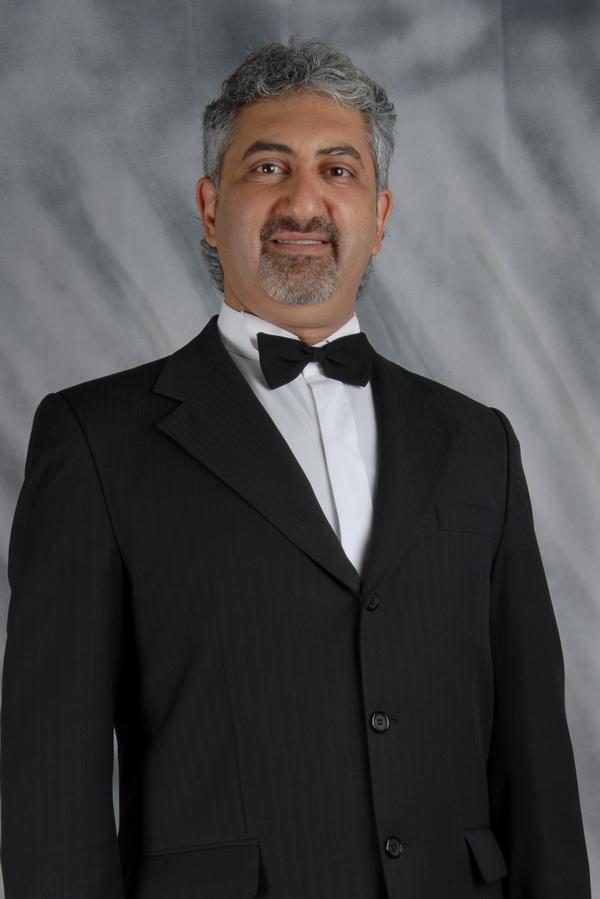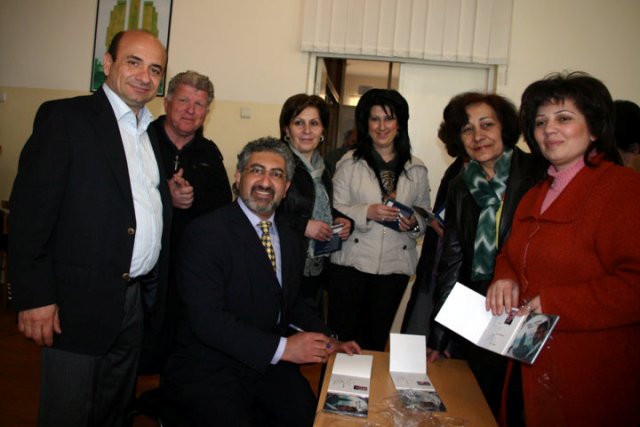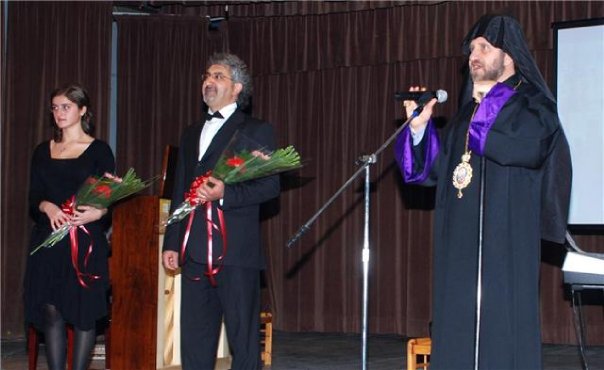
 Azad-Hye
Azad-Hye
Every Armenian should play a role in building Armenia
Kevork Hadjian is a well?known performer of Komitas songs. Originally from Lebanon, Hadjian lives in Armenia since 2004. During his stay in Kuwait (1994-2004) he has cooperated with Azad-Hye in the capacity of the editor of the Prelacy bulletin “Aztarar”.
Before his recent performance in Sao Paolo, Brazil, Irina Hovhannisyan had the following interview with him:
Where have you been born and what kind of childhood did you live outside Armenia?
I have been born in Anjar, an Armenian-populated town in Lebanon, where the inhabitants of historical Musa Dagh took refuge, including my ancestors. I have attended the national Haratch and Caloust Gulbenkian schools in the town. At a very tender age I have been part of the religious choir in the local Saint Boghos church.
Who has been your first teacher of music?
I have taken my first singing lessons from my mother. As a housewife, while she was taking care of our household she used to teach me patriotic songs. I am thankful to God for having such a mother. My father was a peasant, who has also been involved in singing, but only within the circle of friends.
How has life been outside Armenia?
As you know the Armenian Diaspora has a very rich organizational structure. Based on that we had several cultural, athletic, ideological and other organizations in our village. They formed, with the church and school a kind of integral structure, where the character of the patriotic Armenian is formed. I was yearning since very young age to live in Armenia and was striving to reach to that goal. Thank God, this became reality.
Where have you received your musical education?
I have received my musical education at the Theological Seminary of the Catholicosate of Cilicia in Antelias, Lebanon. There, under the guidance of my teachers Kevork Kandaharian and Archbishop Zareh Aznavorian, I seriously researched spiritual, classical and national music. Through their support I became a soloist at the Catholicosate's Shnorhali Choir. I was following during the same time lessons in piano and solfege (voice exercise).
After the Seminary I was accepted to the conducting class in Hamazkayin's “Parsegh Ganachian” Musical College, under the leadership of Harutiun Topigian. I had my first solo appearance in Anjar, performing songs by the famous Armenian musician Komitas. My sister Sevan accompanied me with her beautiful soprano voice.
In 1994 I and my wife were invited to teach in the Armenian School in Kuwait, where my wife Frieda taught Armenology subjects and I taught music and Armenian history. At the same time I was heading the school's children's choir and the Naregatsi multi-voice choir or the Armenian Prelacy of Kuwait and the Arabian Gulf.
After 10 years of prolific life in Kuwait we decided to settle down in Armenia fore ever, aiming at gaining first specialized higher education and living in the country that we had always dreamt about. I was accepted in Yerevan State Conservatory named after Komitas and parallel had the chance to take mastery lessons from the well known international opera singer Barsegh Toumanyan, which I am continue to follow from time to time, while my wife completed Master's program at the Philology Department in the Yerevan State University.
When did you visit Armenian for the first time?
I visited Armenian for the first time in 1998. It is a feeling that you cannot describe when you are eventually in the homeland that you have always dreamt about.
What is your opinion about young performers of classical music?
According to my view Armenia is one of the richest countries in producing artists. There are numerous talented young artists with many virtues. The problem is that these young artists are experiencing difficulties in professional career prospects. Artists in general are not highly valued, a painful fact that forces the artists to leave the country and to look for temporary work in other countries. My pray to God would be to create opportunities that artists feel positive and strong about their presence in Armenia.
Do you think, when time comes, your son would be able to establish himself as expert in Armenia?
As a parent I would like to wish that my son receives specialized education in Armenia because such as musical education is available here at international level. But I am not sure if he will be willing to struggle for establishing a career here after getting his specialization. I wish that he establishes himself in Armenia. We are sowing now and later he will be the one who will decide about any move.
What do you like in Lebanon, which you have not found it here?
I do not want to do comparisons, because I like to look for everything and find it in my country. Yes, Lebanon is my birthplace, it is a beloved and unforgettable place, but in Armenia you find everything related to Armenians: Armenian life, Armenian peace, Armenian eternity. Whatever you have in Diaspora, even if it is the creation of Armenians, it is not considered to be ours. We need to evaluate Armenia as it deserves: a cradle of a centuries old culture, a crossroad for creative civilizations. We are defenders of the Armenian gene, so we need to do everything possible to make the country attractive to all the Armenians who live abroad, so that they all come back to the land of their forefathers, to the eternal Armenian soil. In this context, every Armenian should play a role in building the country of Armenia.
What are your principles in this regard?
To live and to create in Armenia, to struggle here. When we first came to Armenia we stayed in a building near the Opera House in Yerevan, where we could not find peace. We were convinced that in Armenia we needed to build a house on a piece of land and live there and not in a multi-storey building. For that reason we built on a piece of land we had in Proshyan town where I have already cultivated 100-120 trees and I have decided also to do some farming work with animals. This has a psychological meaning related to our understanding of life.
Regarding professional art, I have recorded in Armenia until this moment three CDs. The first is called “First offering of Komitas songs”. The second CD is titled “Bless you” which is a collection of spiritual songs, hymns, melodies, etc. from the spiritual musical heritage of the Armenian Apostolic Church, accompanied by “Sharakan” ensemble under the artistic leadership of the conductor “Daniel Yerajisht (Daniel the Musician). The 3rd CD is titled “Armenia in songs” which is a collection of patriotic songs. Very soon I will produce also a fourth CD.
Mr. Hadjian, what are your hobbies and preferences?
I love the nature very much, I like spending time with my family and friends. My best hobby is researching about Armenia, city by city and street by street.
Today, many people think about traveling to Europe. What do you think, is there anything that the Europeans can learn from us?
To go to Europe just for the sake of being in Europe or for having a better life conditions is something that I do not agree. Going there for academic reasons and for relationship exchange is something positive and beneficial. If we work together we can make Armenia as a hub of many professions and as a lighthouse for higher scientific and cultural life on international level. There are some criteria according to which Europe can be considered more accomplished than Armenia, but even these criteria I consider them relative. For us the issue should be to preserve our national characteristics. If every Armenian finds itself himself/herself enough power and the inner God that can enlightens the path of struggle, I believe we will be able to have an Armenia of the highest criteria and we would be considered on the frontline of the civilized nations.
There are Diaspora Armenians who do not wish to return to homeland. What you can tell them?
I am not someone who can tell with words. I believe in the power of Armenian song and as a singer I would like to see my song useful in this direction. Let my life and songs be as practical words. This is the essential idea. I always, and especially when I am on stage I encourage my compatriots with the idea of repatriation. I wish that this idea through my songs and through the will of God to penetrate into the hearts of my listeners and to carry them into their homeland. If you put a plan towards this direction and if Gods sees that you are honest in your intentions, and even if you lack the financial resources, God would show you the way towards Armenia and how to assist Armenia to be the paradise came true. I would like to ask to my compatriots who today look with nostalgia to Armenia to come and settle down in the fatherland so that they become stronger and live eternally as Armenians. The most important thing is to take that step.
Read about Kevork Hadjian's performance in Sao Paolo, Brazil (Asbarez, 05 January 2012, in Armenian)
Հարցազրոյց Գէորգ Հաճեանի հետ
Կոմիտասեան երգերի մեկնաբան Գէորգ Հաճեանի անցյալն ու ներկան
Իրինա Հովհաննիսյան
Ազատ-Հայ
Որտե՞ղ եք ծնվել:
Ծնվել եմ Այնճարում, այն հայաշատ գյուղաքաղաքում, որտեղ բռնագաղթվեցին մուսալեռցիները, որոնց թվում էին նաև իմ նախնիները:
Ինչպե՞ս է անցել Ձեր մանկությունը հայրենիքից հեռու:
Նախակրթական դաստիարակությունս ստացել եմ տեղի Ազգային Յառաջ եւ Գալուստ Կիւլպէնկեան Վարժարանում: Փոքրիկ տարիքից եղել եմ Սուրբ Պողոս եկեղեցու դպրաց դասի անդամ:
Ո՞վ է եղել Ձեր երգեցողության առաջին ուսուցիչը:
Առաջին երգեցողության դասերս ստացել եմ մայրիկիցս: Երբ նա տնային գործերով էր զբաղվում, ինձ իր կողքը նստեցնում հայրենասիրական և ազգային երգեր էր սովորեցնում: Շատ շնորհակալ եմ Աստծուն, որ այդպիսի մայր եմ ունեցել: Հայրս հողագործ էր, ով երիտասարդության տարիներին երգել է, բայց ընկերական շրջապատում:
Դժվա՞ր էր ապրել Հայաստանից հեռու:
Գիտեք, հայկական սփյուռքը կազմակերպչական առումով բավականին հարուստ դրվածք ունի և այդ առումով ալ գյուղում մենք ունեինք մշակույթային, մարզական, գաղափարական գործունեություն, ազգային օջախներ, իհարկե եկեղեցիին և դպրոցին կողքին ամենը մի ամբողջություն էր, որտեղ կկերտվեր հայրենասեր հայի կերպար: Փոքր տարիքից ես հայաստանյատենչությամբ կապրեի ու կտառապեի` իրականացած տեսնել այն, և փառք Աստծո, որ իմ տենչը իրականություն դարձավ:
Որտե՞ղ եք ստացել Ձեր երաժշտական կրթությունը:
Երաժշտական կրթությունս ստացել եմ Մեծի Տանն Կիլիկիո կաթողիկոսության Զարեհեան դպրեվանքում: Այնտեղ ես առաջին անգամ ուսուցիչներիս` Գևորգ Գանտահարյանի և Զարեհ արքեպիսկոպոս Ազնավորյանի առաջնորդությամբ, լրջորեն ուսումնասիրեցի հոգևոր, դասական, ազգային երաժշտությունը: Նրանց օգնությամբ ես դարձա դպրեվանքի երգչախմբի և Կիլիկիո կաթողիկոսության ?Շնորհալի? երգչախմբի մենակատար: Այս ամենին զուգահեռ ես դաշնամուրի և սոլֆեջիոյի դասերի էի հաճախում:
Դպրեվանքն ավարտելուց հետո ես ընդունվեցի Լիբանանի Համազգային շրջանային վարչության Բարսեղ Կանաչեանի անվան երաժշտական քոլեջի խմբավարական դասարան` Հարություն Թոփիկյանի գլխավորությամբ: Որպես երգիչ առաջին մենահամերգս ունեցել եմ Այնճարում` Կոմիտասյան երգերի մեկնաբանությամբ ու նաև քոյրս էլ՝ Սեվանը, մասնակցում էր իր գեղեցիկ սոփրանոյով։ 1994թ. մենք՝ տեր և տիկին, Քուվեյթի Ազգային Վարժարանի հոգաբարձության կողմից հրավիրվեցինք դպրոցում դասավանդելու: Կինս՝ Ֆրիտան, դասավանդում էր Հայագիտական առարկաներ, իսկ ես երաժշտություն և հայոց պատմություն։ Միաժամանակ ղեկավարում էի Քուվեյթի ազգային վարժարանի մանկապատանեկան և Քուվեյթի Ազգային առաջնորդարանի ?Նարեկացի? քառաձայն երգչախմբերը: Տասը տարի աշխատելով, ապրելով և ստեղծագործելով Քուվեյթում, մենք վերջնականապես որոշեցինք հաստատվիլ հայրենիք` մասնագիտական բարձրագոյն կրթություն ստանալու եւ ընտանեօք ապրելու երազած Մայր Հողում: Ես Հայաստանում ընդունվեցի Երևանի Կոմիտասի անվան պետական կոնսերվատորիա, նաև հնարավորություն ունեցա համաշխարհային օփերայի երգիչ Բարսեղ Թումանյանի մոտ վարպետության դասեր անցնել, որոնք այժմ էլ, մերթընդմերթ, շարունակվում են, իսկ կինս` Երեւանի Պետական Համալսարանի բանասիրական բաժնում սովորեց մագիստրատուրայում:
Առաջին անգամ ե՞րբ եք եկել հայրենիք:
Առաջին անգամ Հայաստան եմ եկել 1998 թվականին: Հրաշալի, անպատմելի զգացումէ, երբ վերջապես քո երազած հարենիքում ես:
Ձեր կարծիքը հայ երիտասարդ դասական կատարողների և երաժիշտների մասին:
Հայաստանը, ըստ իս, արվեստագետներ ծնող ամենահարուստ երկիրներից է: Այստեղ անհամար են տաղանդաւոր եւ արժանիքներով բարձր երիտասարդ արվեստագետները։ Ուղղակի մի խնդիր կա. այսօր մեր երկրում երիտասարդ արվեստագետները մասնագիտական աշխատատեղիների շատ դժվարությունների են բախվում, բացի այդ` արվեստագետը այստեղ ըստ արժանվույն չի գնահատվում եւ ցաւօք այդ երեւոյթը պատճառ է հանդիսանում թողնել երկիրը` ժամանակավորապէս աշխատանքով մեկնելու օտար ափեր: Իմ աղոթքս միշտ առ Աստված այն է, որ արվեստագետը Հայաստանում իրեն ամուր զգա:
Այս ամենից հետո որքանո՞վ Ձեր որդին կկարողական որպես մասնագետ կայանալ Հայաստանում:
Ես որպես ծնող, կցանկանայի, որ իմ որդին Հայաստանում մասնագիտական կրթություն ստանա, որովհետև հայաստանում երաժշտական գիտելիքները եւ միջազգային եւ ազգային դիմագիծ ապահովող բարձրագույն հմտությունը ունեցող վայր է, ես համոզվել եմ դրան, բայց չեմ կարող ասել, որդիս իր մասնագիտությամբ կցանկանա Հայաստանում պայքարել, թե ոչ: Իմ ցանկությունն է, որ նա հայրենիքում կայանա: Մենք ցանում ենք այժմ։ Հետո ինք կորոշի։
Ի՞նչն է Ձեզ դուր գալիս Լիբանանում, որ չկա Հայաստանում:
Ես համեմատություններ չեմ ուզում անել, որովհետև սիրում եմ ամեն ինչ փնտրել և գտնել իմ երկրում: Լիբանանը, այո, իմ ծննդավայրն է, սիրելի է ինձ համար եւ անմոռանալի, սակայն Հայաստանում կա հայու կյանք, հայու խաղաղություն, հայկականություն, հայի հավերժություն, իսկ արտասահմանում ինչ-որ կա` թեկուզ հայու ստեղծածը՝ մերը չէ: Մենք պետք է Հայաստանը ըստ արժանվոյն գնահատենք, որպես բազմադարյան մշակույթային բննօրան, քաղաքակրթությանց ստեղծարար խաչմերուկ, հայու կենաֆոնտի իսկական ժառանգորդներու պահպանողներ և ամեն ինչ անենք, որ այդ հայու ստեղծած ու այսօր անկախ Հայաստանում արտերկրի հայերը ձգտեն դեպի մեր երկիր` հայուն հավերժական հողը: Եւ այս առումով, յուրաքանչյուր հայ մարդ իր դերակատարությունը պետք է ունենա հայաստանաշինության մեջ:
Ո՞րն է Ձեր դերակատարությունը հայաստանաշինության գործում:
Ապրել, ստեղծագործել Հայաստանում, նշանաբանով` պայքարել։ Երբ մենք եկանք Հայաստան, Օպերայի մոտակայքի շենքերից մեկում էինք ապրում, ուր ամբողջական անդորր չկար, եւ համոզված էինք, որ Հայաստանում պետք է հողի վրա կառուցել ու ապրել, եւ ոչ թե բազմահարկ շենքում: Այդ պատճառով ալ, մեր ունեցած հողակտորին վրա կառուցեցինք մեր սեփական տունը, Պռոշեան գյուղավանում,ուր արդեն 100-120 ծառ տնկած եմ, որոշել եմ նաև անասնապահությամբ զբաղվել: Սա կենսահոգեբանական առումով:
Ինչ վերաբերում է արվեստին, ես հայրենիքում առ այսօր ձայնագրել եմ երեք ձայնասկավառակ, առաջինը` ?Կոմիտասեան Երախայրիք?ն էր, երկրորդը` ?Քեզ Օրհնեմք?` Հայ Առաքելական եկեղեցու հոգեվոր երգերեն՝ շարականներ, մեղեդիներ ու տաղեր ?Շարական? անսամբլի նվագակցությամբ, գեղարվեստական ղեկավար և դիրիժոր Դանիել Երաժիշտի ղեկավարությամբ, իսկ երրորդը ?Հայաստանը Երգերում? ժող-հայրենասիրական ձայնասկավառակը: Շուտով նաև կթողարկվի չորրորդ ձայնասկավառակը:
Պարոն Հաճյան, ի՞նչ նախասիրություններ ունեք:
Ես շատ եմ սիրում բնությունը, ընտանիքիս և ընկերներիս հետ ժամանակ անցկացնելը, բայց ամենասիրած զբաղմունքս Հայաստանն ուսումնասիրելն է` քաղաք առ քաղաք, փողոց առ փողոց:
Այսօր շատերն են ձգտում Եվրոպա, ի՞նչ եք կարծում, եվրոպացիները մեզանից սովորելու բան չունեն:
Եվրոպա ձգտել ինքնանպատակ կամ բարւօք կեանք որոնելու իմաստով չեմ կիսում։ Սակայն ակադեմական իմաստով փոխադարձ շփումը դրական եմ համարում և օգտաշատ։ Եթե մենք միավորվենք, այդ բազմաբնոյթ մասնագիտություններով, այնժամ կը կարողանանք ստեղծել գերուժեղ Հայաստան, որը կլինի աշխարհի բարձրագույն գիտական եւ մշակույթային փարոսը: Կան չափորոշիչներ, ըստ որոնց, Եվրոպան ավելի կատարելագործված է համարվում, քան Հայաստանը, սակայն այդ էլ հարաբերական է ինձ համար։ Մեր մեջ հարցը ազգային ինքնուրույնության փաստն է և կարչիլը դրան։ Եթե ամեն հայ իր մեջ ուժ գտնի, ուժ ասելով իր ներքին Աստուածը, նկատի ունեմ, լույսը, և դրանով պայքարի, հաւատացած եմ, որ մենք էլ կունենանք մարդակային բարձրագույն չափանիշներով Հայաստան եւ կհամարվենք քաղաքակիրթ ժողովուրդներու շարքին առաջնայիններից:
Կան սփյուռքահայեր, ովքեր այսօր էլ չեն ցանկանում վերադառնալ հայրենիք, ի՞նչ խոսք ունեք նրանց:
Գիտեք, ես մեկը չեմ, որ խոսքով ասեմ: Հավատացած եմ հայ երգի զօրության և որպես երգիչ, իմ երգը կուզեմ այդ գործին սատարի։ Ապրված կյանքս եւ երգս թող գործնական խօսք լինեն։ Սա է էականը։ Ես միշտ էլ, հատկապես համերգների ժամանակ իմ հայրենակիցներին հետ կիսվելով բեմից, խրախուսում եմ դեպի հայրենիք գաղափարով, եւ Աստուծուց կխնդրեմ, որ միշտ էլ իմ ցանկությունը երգի ճամբով և Աստծո կաքով մտնի այդ մարդկանց սրտերը և նրանց հայրենիք բերի: Երբ նպատակ կա և երբ Աստված տեսնի, որ մտադրությունդ բարի է, նույնիսկ եթե չունես նույթական ու կենսական հնարավորություններր, Աստված ցույց կտա այդ ճանապարհը եւ կօգնի Հայաստան երկիր` դրախտավայրը, իրական դարձնելուն գործում: Ես կխնդրեմ իմ հայրենակիցներին, ովքեր այսօր կարոտով կնայեն Հայաստանին, գան ու հաստատվեն հայրենիքում` հզօրանալու եւ հավերժանալու հայօրեն: Կարևորը քայլն անելն է:
 |
 |
